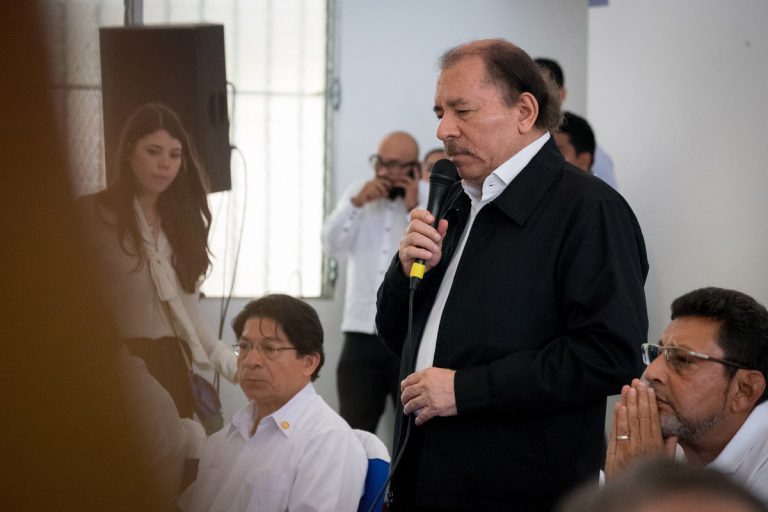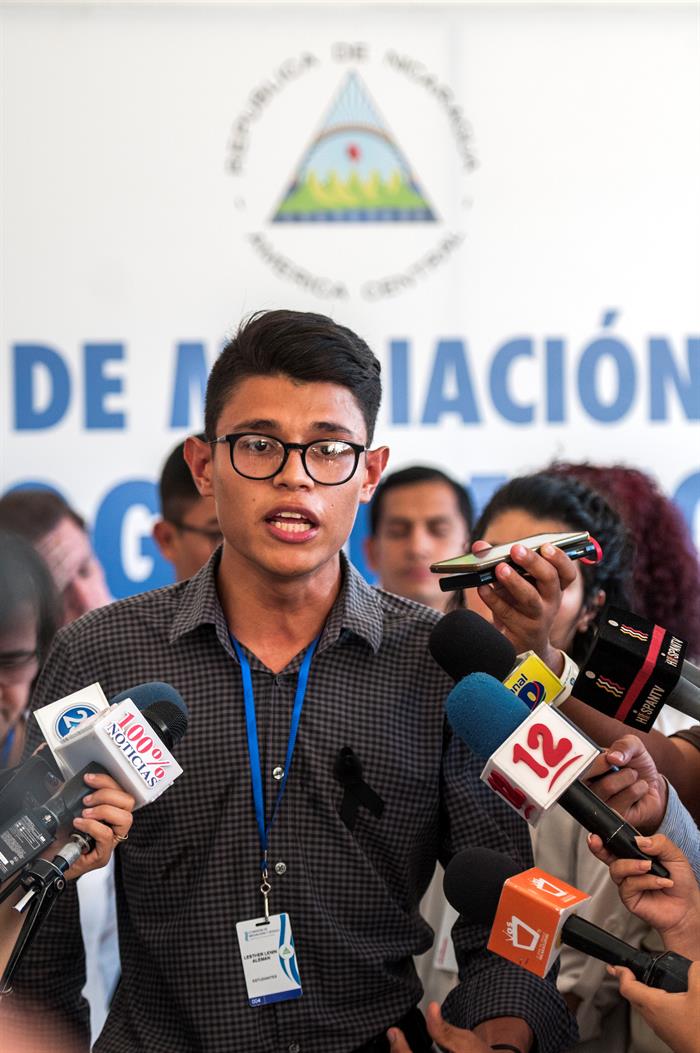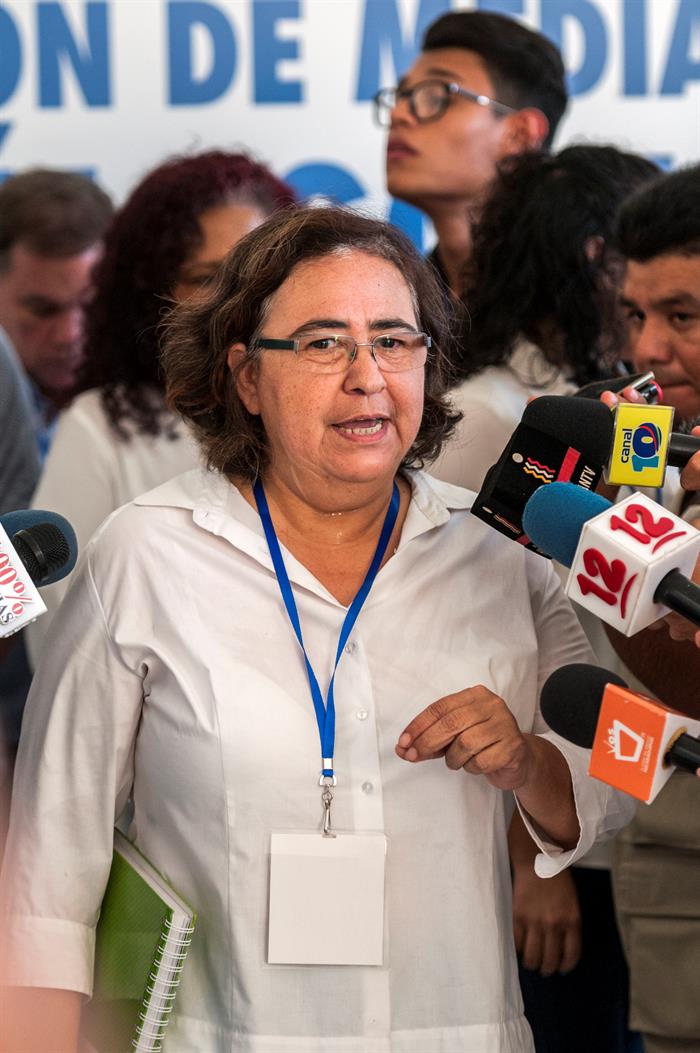27 de junio 2018

Children of Exile: The Births “Sowing Hope” in the Camp of Nicaraguan Farmers

PUBLICIDAD 1M
PUBLICIDAD 4D
PUBLICIDAD 5D
Bipartisan resolution of US senators asks Trump to apply the Global Magnitsky Human Rights Accountability Act on Ortega’s inner circle

The government of Daniel Ortega evaded a response to the question of whether he would accept moving up the (2021) elections to March 2019.
Once more, the government of Daniel Ortega evaded a response to the question of whether he would accept moving up the (2021) elections to March 2019, as the bishops of Nicaragua’s Episcopal Conference have proposed. This Monday, during the resumption of the work groups within the framework of the National Dialogue, the official delegation avoided the topic, which the Civic Alliance of Justice and Democracy had considered number one on the work agenda.
“The initial topic involved having the government express its political will to move up the elections as the Episcopal Conference has proposed,” commented Daisy George, a Civic Alliance representative at the electoral table. “The attitudes and arguments that the government presented made clear the fact that they do not have the political will to deal with the topic of democratization.”
Indeed, the delegation from the regime didn’t want to discuss the requirements and conditions necessary for carrying out an electoral process, such as reforms to the constitution and to the electoral system.
The bishops have insisted Comandante Ortega respond as to whether or not he accepts moving up the elections to the first trimester of next year. The resumption of the National Dialogue that the religious leaders are mediating depends on the response from the Sandinista strongman. “An official and formal response from the President to the bishop’s proposal, put forth to him on June 7th, where we summarized the sentiments of the immense majority of the Nicaraguans, is essential in order to advance and make real a viable dialogue,” insisted Rolando Alvarez, archbishop of the Matagalpa diocese.

Lesther Aleman, a university student representative on the Civic Alliance participating in the National Dialogue. Photo: EFE / Confidencial
The government’s argument, according to university student Lesther Aleman, was that before discussing the level of democratization, “first, the topic of security should be taken up.” The delegation from Daniel Ortega’s regime is fixated on having the citizen roadblocks lifted.
“Even (OAS secretary general) Luis Almagro is talking about moving up the elections. But there’s no openness or political will from the government. The government has clearly demonstrated that they don’t have the will to talk about democratization, which is what the people are clamoring for in order to have real change,” added Daisy George.
The government’s dodging at the dialogue table doesn’t mean that the Civic Alliance is going to abandon it, although some sectors believe that Ortega merely wants to gain time and avoid the central topic of the National Dialogue, which is the democratization.
In terms of this perception, Azhalea Solis from the Civic Alliance said that they are first trying to “create an atmosphere of peace” and “on the electoral theme, we’ll see later what the Nicaraguan people say, not Daniel Ortega.” “We need to strain our patience, because avoiding a civil war is fundamental,” she argued.
The work group for Security and Verification met on Monday, June 25, with members of the team from the Special Monitoring Mission for Nicaragua (Meseni) set up by the Inter-American Commission for Human Rights (IACHR), headed by Columbian Alvaro Botero and Peruvian Fiorella Melzi.
“The Verification and Security Commission worked on their mission and their functions. It was agreed that the number one point to consider is the defense of life,” informed Azahlea Solis. “We proposed to the IACHR some necessary indicators, such as visits to the jails, to the clandestine prisons, gathering the testimony of those who have been tortured, looking at the intimidation and threats made to many people, and the illegal detentions,” she enumerated.

Azahalea Solis, an expert on Constitutional Law and a Civil Society representative in the National Dialogue. Photo: EFE / Confidencial
Meseni’s objective is to follow up on the recommendations made by the IACHR after their visit to the country, recommendations that were outlined in the final report entitled, “Serious human rights violations in the context of social protests in Nicaragua.”
This Special Monitoring group will follow up on the precautionary measures for those in grave risk of loss of life or physical integrity and will continue to monitor the human rights situation in Nicaragua within the goals that are pertinent to the IACHR’s mandate. “For that, the Meseni will hold dialogues and working meetings with civil society, the state and other relevant actors,” a communique from the IACHR explained.
Confidencial has learned that the members of Meseni met with important people from Daniel Ortega’s government this Monday, June 25, until late into the night. Nonetheless, it’s not known what topics they touched on. The bishops from the Episcopal Conference also met with Meseni delegates Monday afternoon.
Also on Monday afternoon, June 25, the Episcopal Conference informed that Cardinal Leopoldo Brenes and Monsenor Rolando Alvarez will travel to Rome to fulfill their religious duties; at the same time they’ll take advantage of the opportunity to meet with Pope Francis and lay before him: “the pain and suffering that Nicaraguans are living with.”
The communique from the Nicaraguan Episcopal Conference indicates that Cardenal Brenes will participate in the Cardinal’s Consistory called by Pope Francis and, following that, the two Nicaraguan bishops will have a private audience with the Pope.
“In said audience, they will inform our Sainted Father Francis about the situation of pain and suffering that we Nicaraguans are living through, and the impulse that we’ve given to the Dialogue we’re participating in at the request of the government and supported by the trust of the population,” the Episcopal Conference noted.
Eight US senators issued a bipartisan resolution condemning the repression carried out by the Ortega government and urging President Donald Trump to apply sanctions via the Global Magnitsky Human Rights Accountability Act to the regime’s authorities in Managua.
Although the senators don’t specify which authorities they’ve urged Trump to sanction through the Magnitsky Act (already applied to former magistrate Roberto Rivas), they do specify that it would be for those involved in “extrajudicial killings, torture, or other gross violations of human rights in Nicaragua”; or those who are “responsible for or complicit in ordering, controlling, or otherwise directing acts of significant corruption in Nicaragua”.
The bipartisan resolution is sponsored by Republicans Marco Rubio, Ted Cruz, David Perdue and Mike Lee, and Democratic senators Bob Menendez, Bill Nelson, Tim Kaine and Dick Durbin.
The senators condemned, “the violence perpetrated against the citizens of Nicaragua by the Ortega regime and affiliated armed irregular groups.” In the next line, they call on the government of Nicaragua “to end the repressive practices of its security forces and enact constitutional and legal reforms to better protect its citizens.”
In the senators’ view, Ortega’s government should make a commitment to negotiate with the representatives of the Catholic Church, civil society, the student movement, the private sector and the opposition to put an end to the current political crisis. The resolution underlines the inclusion of a “commitment to hold early elections that meet democratic standards and include international observation,” as the US State Department has already proposed.
Archivado como:
PUBLICIDAD 3M
Periodista. Destaca en cobertura a violaciones de derechos humanos: desplazamiento forzado, tráfico ilegal en territorios indígenas, medio ambiente, conflictos mineros y ejecuciones extrajudiciales. Premio Iberoamericano Rey de España 2018.
PUBLICIDAD 3D